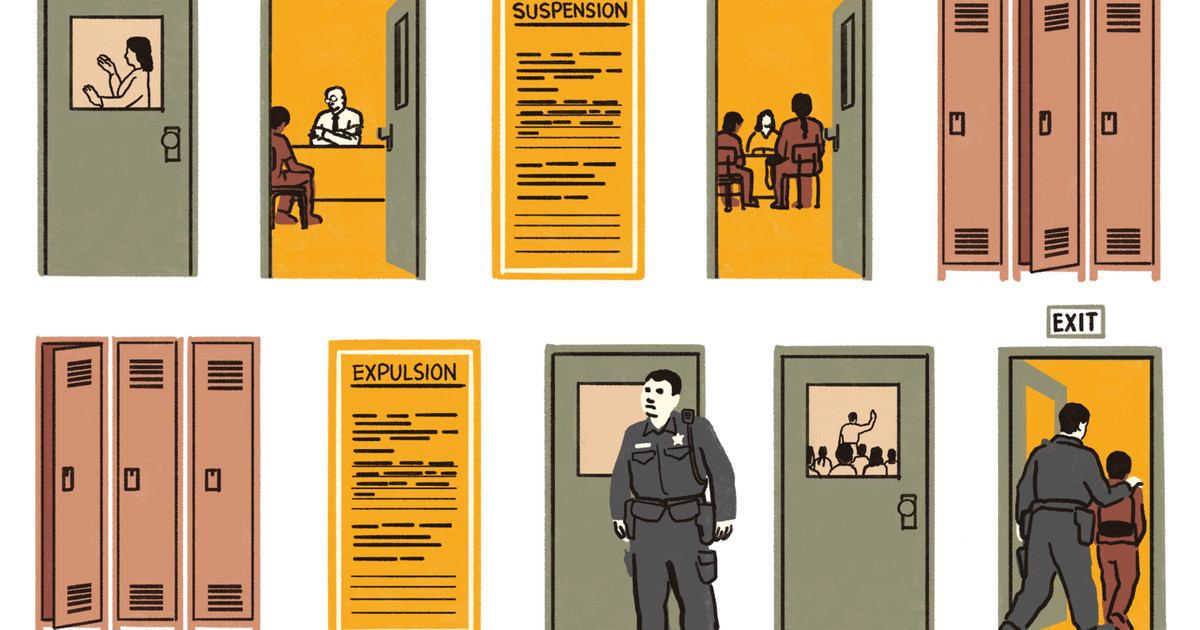We wrote this story in plain language. Plain language means it is easier to read for some people.
This is a guide to school discipline in New Mexico and Gallup-McKinley County Schools. You can print and share a short copy of this guide.
This guide is part of a project by ProPublica and New Mexico In Depth.
We are reporters. We are not lawyers or advocates. We want to give you information.
School discipline means how schools punish students for breaking rules. For example, schools can:
- Give students detention.
- Suspend students. Suspend means students are kicked out of school for a limited time.
- Expel students. Expel means students are kicked out of school for a long time.
New Mexico public schools expel Native American students more often than white students. Gallup-McKinley County Schools is the reason for most of this difference. Gallup-McKinley County Schools is in western New Mexico.
We wrote a story about how Gallup-McKinley County Schools expels students more often than in the rest of the state. Gallup-McKinley County Schools calls the police on students more than the rest of the state.
Mike Hyatt is the superintendent of the Gallup-McKinley County Schools. He did not respond to our questions. He called our story “completely false.” He said Gallup-McKinley County Schools expelled 15 students in the last 7 years.
But we found data that said Gallup-McKinley County Schools expelled students at least 211 times between fall 2016 and spring 2020.
We talked to many families in Gallup-McKinley County Schools. Many said they thought the district was harsh. Families also said school discipline is confusing.
Roxanne Arthur was a social worker. She worked with Gallup-McKinley County Schools.
Roxanne works for the Native American Disability Law Center. She said families do not understand the school discipline process. Some families do not speak English. That makes school discipline hard to understand.
Roxanne said, “I don’t think the time is taken to really explain the situation to a parent.”
This guide explains how school discipline works in Gallup-McKinley County Schools and other New Mexico public schools.
- Some rules come from the national government. All schools must follow these rules.
- Some rules come from the state. All New Mexico schools must follow these rules.
- Some rules come from the Gallup-McKinley County Schools handbook. Gallup-McKinley County Schools must follow these rules.
You can visit this website to learn about rules in other states. You can also ask school officials about the rules in your state.
This guide answers these questions about discipline in New Mexico schools:
You can ask us questions at [email protected].
Do New Mexico schools tell parents when they discipline students?
Schools in New Mexico have to tell parents when they discipline students. Schools must:
- Call parents.
- Meet parents in person.
- Or send a written note to parents.
If a school is kicking a student out, it has to tell parents why.
The student can say that the school is wrong. The school has to show how it knows the student broke a rule. The school has to let the student share their side of what happened.
Can New Mexico schools call the police on students?
All schools in the United States have to call the police if a student has a gun at school.
Gallup-McKinley County Schools says it will call the police if a student:
- Sexually assaults someone (hurts someone sexually).
- Commits aggravated assault (hurts someone badly).
- Breaks into the school.
- Sells or gives out drugs or alcohol.
Gallup-McKinley County Schools can call police if a student:
- Fights.
- Does graffiti.
- Brings drugs or alcohol to school.
- Breaks other serious rules.
How do New Mexico schools decide how to discipline students?
Each school district makes its own rules for how to discipline students.
Schools in New Mexico cannot hurt students.
The U.S. government has a rule that says schools need to expel students for 1 year if they bring a gun to school. But schools don’t have to follow the rule all the time.
Do New Mexico schools have to hold disciplinary hearings for students?
Students can’t be kicked out of school for more than 10 days without a disciplinary hearing.
Disciplinary hearings are meetings. The meeting usually includes:
- The student.
- Their parent or caregiver.
- People who work for the school district.
The school district needs to tell parents there is going to be a hearing. The district can send a letter in the mail or give it to parents in person. In New Mexico, this letter has to:
- Be sent 5 or more days before the hearing.
- Explain what rules the student broke.
- Explain what discipline the student could get.
- Tell you when and where the hearing is.
- Tell you they can discipline the student even if you do not go to the hearing.
- Tell you how to reschedule.
- Families in Gallup-McKinley can call 505-721-1074
At hearings in New Mexico, you can:
- Ask to have someone translate for you. You do not have to pay money for a translator.
- Tell your side of the story.
- Bring evidence and witnesses.
- Bring a lawyer.
- You have to tell the school 3 days before the hearing if you want to bring a lawyer.
- Ask for a recording or notes from the meeting.
The person in charge of discipline makes a decision after the hearing. They should only use evidence from the hearing to decide. The school district needs to prove the student broke the rules.
They write the family a letter within 10 days of the hearing. The letter tells the family what discipline the student will get.
Can New Mexico schools search students or their things?
Courts in the United States have said that students should not be searched without “reasonable suspicion.” Reasonable suspicion means the school has a valid reason to think the student broke a rule.
New Mexico rules say school officials need a witness when they search a student. A witness is an extra person who watches what happens. The witness and the school official must be the same gender as the student.
What rights do students with disabilities have?
Some students with disabilities have individualized education programs, or IEPs. An IEP says what special education services the student gets.
Schools in the United States cannot suspend or expel students with IEPs for more than 10 days if:
- The student broke a rule because of their disability.
- The student broke a rule because the school did not follow their IEP.
The school has a meeting to decide if the student broke a rule for one of these reasons.
Schools can suspend students with IEPs for 45 days if the student brings a gun or drugs to school. The school would need to have a special meeting first.
The school needs to keep teaching suspended students who have disabilities. For example, the school can provide schoolwork to take home.
How does Gallup-McKinley County Schools decide how to discipline students?
Gallup-McKinley decides how to discipline students based on:
- The student’s age.
- What rule the student broke.
- If the student has been in trouble before.
Gallup-McKinley can change its rules. The district puts the rules on gmcs.org. You can ask your student’s teacher about the rules.
There are four levels of discipline:
- Level 1: Warnings and conversations with students or parents.
- Level 1 is for students who break small rules like:
- Missing school a few times.
- Not wearing the right clothes.
- Interrupting class.
- Cheating.
- Using their cellphone.
- Gambling.
- Having energy drinks.
- Level 1 is for students who break small rules like:
- Level 2: Suspension from clubs, sports and other after-school activities.
- Level 2 is for any of the rules in Level 1 or for things like:
- Bringing tobacco or cigarettes to school.
- Bringing a small knife to school.
- Acting out or causing a disruption.
- Hurting someone.
- Showing affection publicly.
- At Level 2, students can also:
- Get detention.
- Get in-school or overnight suspension.
- Have to pay for anything they break or destroy.
- Level 2 is for any of the rules in Level 1 or for things like:
- Level 3: Short suspension from school and activities.
- Level 3 is for when a student breaks rules many times or breaks serious rules. Serious issues include:
- Fighting.
- Threatening to hurt someone with a weapon.
- Bringing or using drugs or alcohol at school.
- At Level 3, the student is either:
- Suspended for 3 to 5 days from school and activities.
- Taken out of school immediately for 1 day.
- Level 3 is for when a student breaks rules many times or breaks serious rules. Serious issues include:
- Level 4: Suspension from school and activities.
- Level 4 is for when a student breaks rules many times or breaks very serious rules. Very serious issues include:
- Hurting someone sexually.
- Bringing weapons to school.
- Breaking into the school.
- Setting something on fire.
- Selling or giving out drugs or alcohol.
- At Level 4, the student is:
- Suspended from school for 5 to 10 days.
- Not allowed to do clubs, sports or other activities for 1 year.
- Level 4 is for when a student breaks rules many times or breaks very serious rules. Very serious issues include:
The school needs to have a disciplinary hearing if it wants to:
- Suspend a student for more than 10 days.
- Expel a student. Being expelled from Gallup-McKinley County Schools used to mean being removed from school for at least 90 days. Now being expelled means a student cannot ever come back to school.
The school district can decide to discipline the student at any level they want.
Does discipline mean Gallup-McKinley students cannot play sports?
Suspended or expelled students cannot play sports.
The school can suspend students from sports, clubs and other after-school activities without a hearing.
- Level 2 Discipline:
- The student cannot play sports for however long the school district says.
- Level 3 Discipline:
- First time the student gets in trouble: The student cannot play sports for 30 days.
- Second time the student gets in trouble: The student cannot play sports for 45 days or until the end of the season.
- If the student uses or brings drugs or alcohol to school: The student cannot play sports for 45 days or until the end of the season.
Gallup-McKinley can change its rules. The district puts the rules on gmcs.org. You can also ask your student’s teacher about the rules.
How can I complain about schools in New Mexico?
You can disagree with how the school wants to discipline your child. You can ask for an appeal. Appeal means you ask the district to look again at your child’s case.
You must tell the district you want to appeal. You have 10 school days to do this after getting the decision.
Your district does not have to review all cases. Reviews should be done in 15 days.
The 2022-2023 handbook for Gallup-McKinley County Schools does not tell families how to appeal.
You have the right to complain if you are not happy with discipline at your school.
It is against the law for the school to punish you or your student for complaining.
Bryant Furlow of New Mexico In Depth and Maya Miller of ProPublica contributed reporting. Rebecca Monteleone translated this story into plain language.



